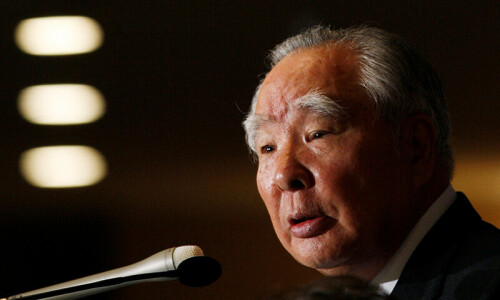RIYADH: Mobarak Musa, a mobile telephone salesman from Syria, has spent 10 years working in Saudi Arabia, sending part of his wages back home to support his parents and three brothers. A shift in Saudi labour policy means he won’t be able to do so for much longer.
In early March, the Ministry of Labour announced that within six months foreigners would be banned from selling and maintaining mobile phones and accessories for them, in an effort to keep open more jobs for Saudi citizens.
So Musa became one of hundreds of thousands of foreign workers in Saudi Arabia who may lose their jobs and be sent back to their home countries this year, as low oil prices slow the kingdom’s economy and prompt the government to restrict employment opportunities for expatriates.
“I don’t know where else can I go — I don’t know any other job to do,” Musa, in his 30s, said in his small shop at a mobile phone market in downtown Riyadh.
Millions of foreigners from south Asia, southeast Asia and elsewhere flocked to work in Saudi Arabia during the economic boom of the past decade, filling relatively low-paid posts in the oil industry, construction and services as well as many middle-management and professional positions.
Foreigners accounted for 10.1 million of the total population of 30.8m in 2014, according to the latest official data. The money they sent home was important for their home countries; they remitted $9.1 billion out of Saudi Arabia in the third quarter of 2015, central bank data shows.
The inflow of people may now go into reverse. Saudi economic growth is slowing as low oil prices produce a state budget deficit that totalled nearly $100bn last year, forcing the government into spending cuts.
Many analysts expect gross domestic product growth, which averaged over 5 percent annually between 2006 and 2015, to fall well below 2 per cent this year. Partly because labour rules make it hard and costly to fire Saudi citizens, layoffs in the early stages of a downturn tend to hit foreigners almost exclusively.
Meanwhile the government, lacking the cash to create public sector jobs for Saudis as freely as before, and worried that the official unemployment rate of 11.5pc among them could rise, is intervening more heavily in the labour market to push Saudis into jobs previously held by foreigners.
A top executive at a major Saudi company told Reuters in January that he wouldn’t be surprised if one million foreigners had to leave the kingdom by the end of this year.
“The economic changes have started to pressure the labour market, and this has triggered the start of the migration of a large segment of foreign workers,” said prominent Saudi economist Fadl al-Boainain.
“Declining corporate profitability has made the foreign workforce a target for managements seeking to cut fixed financial obligations.”
CONSTRUCTION: So far, layoffs have been concentrated in the construction sector, which analysts estimate employs around 45pc of foreigners. Hit by shrinking state contracts and delays in payments owed to them by the government, construction firms have been laying off tens of thousands of people since last year.
“After 12 years in a stable job with a big company, I have started to update my CV and send it to other employers,” said Abu Fadi, a Palestinian-Lebanese engineer at a big construction company in Riyadh which is facing a liquidity crunch and hasn’t paid salaries to its staff since September.
Abu Fadi, who has delayed his marriage plans until his future is clearer, said some of his colleagues who had brought their families to the kingdom were now unable to pay the rent. Some 5,000 technical workers at his company have left, he said.
Job losses among foreigners look likely to spread to other sectors, partly because of government policy. Labour ministry spokesman Khaled Abalkhail said the ban on mobile phone sellers would affect about 20,000 workers, and that similar action would eventually be taken in other industries.
“The labour ministry targets aim to create jobs for around 1.3 million Saudis...There are plans for gradual nationalisation of other sectors such as taxis, travel and tourism, real estate, jewellery and vegetable markets,” he told Reuters.
Abalkhail said displaced foreign workers could try to find jobs in other sectors. But it will be hard for many do so in a slowing economy, and many lack training for skilled jobs. If they cannot find a company to sponsor a work visa for them, they will have to leave the country within about 90 days.
Even some highly paid foreign professionals are considering leaving the kingdom because they see fewer opportunities as the flow of oil money shrinks.
After more than nine years in Saudi Arabia, a British petrochemical consultant in the oil-producing Eastern Province said he was considering returning home as projects in the industry were postponed and budget approvals were delayed.
“Last year was mostly fine, but the end of last year and this year are the worst I have seen,” he said, speaking on condition of anonymity because he was not authorised to discuss the economic prospects of his firm.
Published in Dawn, March 24th, 2016













































